International Child Abduction in Brazil

|
As opposed to other countries who have signed the Hague Convention on the Civil Aspects of International Child Abduction, Brazil is a country that never returns any abducted children. Typically, Brazil delays all Hague cases for many years and then says they cannot return the abducted children because they have already been in Brazil for too long. This is obviously a clear violation of the Hague Convention. At the same time, Brazil prevents the left-behind parent from visiting his children in Brazil. If the left-behind parent tries to visit his children in Brazil, he is immediately arrested and told to pay a large amount of money for alleged child support payments. After making this extortion payment, he is escorted directly to the airport and sent back to his country, without being allowed to see his children. Legal experts in international Hague proceedings refer to this Brazilian practice as: "State Sponsored Child Abduction." The criminal behaviour of Brazil in relation to children abducted to Brazil reminds some people that Brazil is a country that does not extradite criminals and that Brazil was a preferred destination for Nazi war criminals. Brazil is a heaven for child abductors. Brazil is now considered a preferred destination for child abductors, even for those who are not from Brazil. It is widely considered that Brazil is committing a crime against children by assisting those who chose to kidnap children to Brazil. Brazil's abduction culture and corrupt politics are considered to be a main factor in this criminal behaviour. Even Brazilian officials agree that Brazil's corruption and politics play a significant role in Brazil's behavior in these cases. Brazilian left-behind parents do not suffer the same injustice in relation to Hague Convention cases in other countries as non-Brazilian parents suffer in the Brazilian courts. Many countries have returned children to Brazil under the Hague Convention. The same Brazilian authorities that delay cases in Brazil indefinitely, and that refuse to return any abducted children to their countries of origin, work very fast, efficiently and aggressively, when trying to get abducted children back to Brazil. An International Parental Abduction is not an international custody battle. A custody battle is done in divorce court, family court, a civil court, a local court. But an International Parental Abduction case is done in a Federal Court in the country where the children have been abducted to. All that Brazil has to do in these cases is to return the abducted children to the country from where they were taken and let the divorce court in those jurisdictions handle the custody issues. The following cases provide good examples to the criminal behavior of the Brazilian government. Today there are thousands of parentally abducted children in Brazil from all over the world, so these cases are just a few of them. These cases illustrate the fact that Brazil's official policy is to never return any abducted children, and this makes Brazil unique for those countries which have signed the Hague Convention. All these cases have been classified as International Parental Abduction cases, and are being dealt as such by the Brazilian Federal Courts. All cases mentioned are also being followed by law enforcement agencies in Brazil and elsewhere. Brazil is not complying with its international obligations under the Hague Convention. The US State Dept has also stated that Brazil is not compliant. All these cases are being handled by a Brazilian Federal Court, and the results given have been reached by the various Brazilian Judges handling these cases. Brazilian officials agree that there is a problem, they do not deny it.
Cases of Children Abducted in Brazil
Goldman
The case of It is argued that the Goldman abduction is a model of the type of case that The Hague Convention was designed to resolve. However, his case became much more than an international child abduction case and turned into a nationalist war of words and media frenzy, with the Brazilian side claiming that the child was Brazilian and that any attempt to return him to the US would be in contravention of the Other children abducted to or within Brazil are Lorenzo Ayubo, Yehezkel Hanan, Israel Haim, and Yoshua Itai , Kelvin Birotte, Rebeca Boyle, Nadia Davenport, Nicolas, Laetitia & Anthony Gerber, William and Gabriella Gorgas, Lucas Larivee, Thiago Maciel/van Driel, Thiago de Sousa Maciel, Chelsea & Bailey Oliveira-Manzi, Nicole Pate, Emily Sanchez/Machado and Paul and Anna Weinstein. Ayubo
Lorenzo Ayubo was kidnapped and taken to Brazil from the US on August 23, 2004 during what was supposed to be a two week visit with his mother,
Yehezkel Hanan, Israel Haim, and Yoshua Itai were born in Israel. The family moved to Florida in July 2006. Eight months later, on March 20, 2007, Smadar Hameiry abducted the 3 children to Sao Paulo, Brazil. The left behind parent filed for divorce in Florida and was granted full custody of the children. Smadar Hameiry was represented at the Florida divorce trial by her Florida attorney. the left behind parent also filed a Petition for the Return of his children under the Hague Convention on the Civil Aspects of International Child Abduction. An Application for the Return of the Children was filed by the children's father through the U.S. State Department on June 13, 2007, and was received by the Brazilian Central Authority on July 13, 2007. The Brazilian Federal Court has found that the children were illegally removed from Florida and illegally taken into Brazil because Smadar Hameiry traveled to Brazil without the permission of her husband and without the permission of the Florida Court. The Brazilian Federal Court has also recognized the Florida divorce, that the left behind parent has legal custody of his children, and that the children are being illegally retained in Brazil by Smadar Hameiry. Nevertheless, the Brazilian Federal Court has stated that because the children have been in Brazil for such a long time (after an unexplicable 20 month delay in starting the trial) without having any contact with their father, that it would be in their best interest to stay in Brazil with their mother. According to the Hague Convention, the children should have been returned to Florida, USA, by August 2007. Brazil has been determined to be non-compliant with the Hague Convention in this case. While the Brazilian Federal Court handling this International Parental Kidnapping case has so far refused to return the abducted children, they have also made it very clear that Smadar Hameiry must allow the children to communicate with their father every day. Furthermore, on 7 August 2009, the Brazilian Federal Court issued an Order stating that Smadar Hameiry can return to Israel with the children if she wishes to do so. But the children are still in Brazil, and Smadar Hameiry and her family in Brazil have stated that they will never let the children talk to their father again. Birotte
Kelvin Birotte was born in Gerber
Nicolas, Laetitia and Anthony Gerber were born in France and were abducted in September 2006 in He was not allowed to be alone with his children and was supervised and filmed and recorded by his ex-wife, her brother and an unknown armed man. He was also visited by a ‘Judicial representative’ who threatened him in front of his children with arrest if he did not pay spousal support of 75,000 Euros within three days. In an interview with Le Figaro, Gerber says, “I have done nothing more than ask for justice all these years. I control my pain as hard as I can. In three years, my ex-wife not even sent a short note about our children. They no longer speak French or know anything about French culture. Both have been completely eradicated from their lives. From birth, I always looked after our children, parental authority was always been shared between us and now, as part of the divorce (which she never had the dignity to respond to) I have ‘right of custody’ under the law in France. I have submitted to the Brazilian court more than 70 sworn statements of good moral standing under the quality of a man, father and husband. How long will Brazilian courts take to solve such cases as mine and make so many people suffer (grandparents, uncles, cousins, father, and of course, our children in the first place)? How long the courts will deny their international commitments? How much longer will the courts allow one of the parents to practice Drummond
On February 7, 2009, Nadia Drummond was due to be brought to her father’s home in Pate
Robert Martin Pate of Houston, Texas, met Brazilian woman, Larivee
In 2001, François Larivee met Ione, a Brazilian woman who had been working as an architect in Montreal for 5 years. Two years later, when they found out she was pregnant, the couple bought a house, began living together and had a son, Lucas Larivee. In January 2004, Ione left and spent 12 weeks in Brazil and when she returned to Montreal their relationship imploded. In August, Larivee moved out and an agreement was signed in which he was allowed to visit his son three to four times a week. Before they had a chance to negotiate the child's custody, though, Ione, alleging she was going on a "short-trip" to the United States, abducted their son to Brazil. Larivee found out about this only when he returned to the house where his ex-partner lived and realized that his sons belongings were missing. He called the police but his attempts to get his son back to Montreal, even to negotiate basic custody, were in vain. He issued a request for return under the Hague Convention and it was sent by the Canadian central authority to SEDH, the Brazilian central authority. “At the time, I thought it would take a month or two to bring him back�?, he said “I never wanted to make this public, but I don't think there is anything else I can do but go to the media�?. According to Canadian legal sources, international abduction cases between Canada and other countries are sorted out quickly and efficiently except in the case of Brazil, “the difficulty with this Brazilian case is that we are buried in delays. There is always another appeal available to the mother.�? Ione was able to obtain custody of the child in the Rio de Janeiro family court, alleging on perjured evidence that Larivee had abandoned them. Because of this, Larivee had to transfer the case from the Family Court to the Federal Court. In March 2007, almost two and a half years after the original petition, the Federal Courts determined that the child should be returned to Canada. The child could not leave the country until all the appeals had run out, though. In October 2007, the Federal Court of Appeals rejected Ione's arguments and demanded that the child be returned to Canada and Larivee travelled to Rio de Janeiro to pick up his son. It should have been a simple operation, but when court officials went to pick up the child, Ione had fled with the child again. Her lawyer who was, in the meanwhile, inside a car parked in front of the house informed officials that the door was open. According to Larivee, his ex-partner's father was in the house and told authorities: “François is a nice guy, but my daughter is a lioness and will fight until the end, you will never get that child�?. Two days later, Ione obtained a decision from the vice-president of the Federal Court of Appeals suspending the decision to remove the child to Canada. After receiving another reprimand, she prepared two more appeals - one in the Federal Supreme Court in Brasilia and another in the Federal Supreme Court of Rio de Janeiro to try to suspend the previous decisions. In May 2010, According to the judge, the agreement was "the best way to guarantee the welfare of the child" and thus the Hague Convention will be fulfilled. The judge explained also that the arrangement is temporary because the decision may be reviewed by the Canadian courts when the mother returns there. The Brazilian Supreme Court described Ione’s actions in this matter as being motivated by ‘bitterness’. Zensen
In February 2004, Robert Zensen formally authorized his daughter, Maria Carolina's, mother to take her to Brazil, based on a shared parenting agreement that they had negotiated and signed in front of the Superior Court of New Jersey, USA. He trusted that Maria Carolina's mother would comply with the agreement. His daughter has been illegally retained by her mother and has been in Brazil since July 2004 without Zensen’s authorization or approval. Zensen is not asking for custody; he only wants his daughter to spend her school vacation with him, as was agreed. Child support payments were suspended by the Weinstein
Timothy Weinstein married a Brazilian woman in 1996 in Pittsburgh, in the US. Paul Weinstein was born in 1998 and Anna Weinstein was born in 2001, in Pittsburgh. Both Paul and Anna have Brazilian passports due to their mother's nationality. Throughout the marriage, the wife regularly took the children to Brazil each winter and summer. In June 2006 the wife left for Brazil with the children, promising to return in August 2006. Weinstein visited Brazil as usual in July 2006. About the date of her return, the wife notified Weinstein that she would be staying in Brazil with the children. In September 2006, Weinstein sought a court order in the United States to establish their habitual residency, seek their return, and obtain primary custody. The court established residency, ordered the return of the children but gave primary custody to my wife. Although he did not obtain primary custody, Weinstein’s custodial rights were preserved as required to allow him to petition under the Hague Convention. His wife was properly notified and had legal representation at the hearing. In response to the order in the United States, his wife obtained a court order in Brazil giving her full custody of the children and legitimizing her presence in Brazil with the children. Her attorney cited as evidence a United Nations law that has never been accepted as valid by the United States. He was not notified of the hearing and did not have legal representation. In October, 2006, Weinstein petitioned the US As of June 2010 and since the Weinstein children’s abduction, there has not been a ruling and none is foreseeable in the near future, Weinstein’s wife continues to be in defiance of the order of court in the United States, there have been four different case workers at the Department of State, Office of Children’s Issues and, because communication between them and SEDH is strained, Weinstein has had to rely on unofficial channels to learn of developments in his case – either by contacting SEDH directly or asking the Brazilian federal attorney handling his case his children or his wife. Weinstein has been able to maintain a relationship with his children, despite the difficulties placed in his way. van Driel-Maciel
Thiago De Sousa Maciel has been held in the state of Rezende-Boyle
Not all abductions involve moving the child to Brazil from another counry. In the case of Rebeca Rezende Boyle, the abducting parent, Sanchez-Machado
Michael Sanchez met One year after the parenting agreement, however, on March 27, 2008, Nigia informed Sanchez that she would be leaving for Brazil because of ‘frustration with the courts’ and the fact that he knew she was an illegal immigrant in the US. Sanchez’s experiences with authorities in the US and Brazil reflect others’ experiences. The Illinois State Police, the FBI and the Manzi
Not all Brazilian abductors are women; in November 2006, Zanger
Sascha Zanger, an Austrian citizen, married Brazilian woman Certain patterns and strategies seem to emerge from these cases and these involve abducting parent playing a game which switches from simply ignoring requests for the child's return and disappearing to appealing with counter claims against the Complaints by European Countries
On October 19, 2010, the French MEP, Michele Striffler, tabled a question in the European Parliament on Brazil's refusal to abide by its international treaties in this regard: The Convention on the Civil Aspects of International Child Abduction, of 25 October 1980, known as the Hague Convention, seeks to guarantee the immediate return of children unlawfully removed or retained by one of their parents in a contracting State. It also seeks to ensure that the custody, visitation and accommodation rights of children in contracting States are respected. Under Article 3, the removal abroad of a child by a parent is considered unlawful when it takes place in violation of the custody rights granted to the other parent, or to any institution or body, under the laws of the State in which the child normally resided before being removed. Furthermore, the Hague Convention lays down a simple and swift procedure for resolving the removal of minors outside their country of usual residence, without exhaustive examination of the dispute between the parents. Rulings on the custody of such children can only be issued by a judge in the child's usual place of residence Moreover, a best practice guide has been drawn up by the Hague Permanent Office (responsible for monitoring implementation of the convention), to avoid disparities in the scope and level of services offered by the various central authorities entrusted with the task of enforcing the convention. Nevertheless, the legal systems in numerous States which have signed the Hague Convention (in particular the Brazilian legal authorities) continue to consider these cases as child custody disputes, in flagrant contravention of the letter and spirit of the convention, thereby significantly delaying the implementation of its provisions and the resolution of disputes. It should be borne in mind that these displaced children are the main victims in such situations. Their prolonged removal has serious psychological repercussions which may dramatically affect their future lives. There are many unresolved cases involving European children who have been taken to third countries which are signatories to the convention (particularly Brazil) and whose return is being obstructed by poor application of the Convention. What measures does the Council intend to take to ensure that third countries, in particular Brazil, comply with the Convention, with a view to putting an end to these unacceptable situations and securing the swift return of abducted children? |
External links
|
|
The Rise of Jew Hatred in Brazil and South America
|
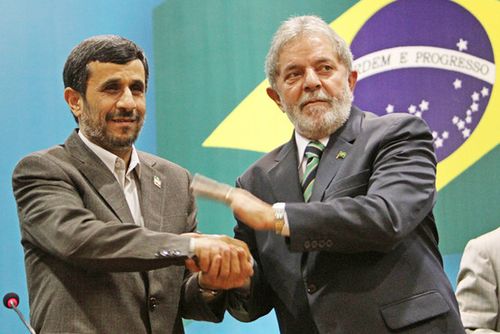 Wall Street Journal: Finally, there is the issue of Brazil's apparent lack of concern regarding Iran's increasing penetration into Latin America through Venezuela. There are now weekly flights between Caracas and Tehran that bring passengers and cargo into Venezuela without any customs or immigration controls. Venezuela has also signed agreements with Iran for transferring nuclear technology, and there is speculation it is giving Iran access to Venezuelan uranium deposits. Brazilian police discover 450 kg of contraband uranium bound for... Iran? Instead of expressing concern over Iran's activities in Latin America, Brazil is drawing closer to Tehran and hopes to expand its $2 billion bilateral trade to $10 billion in the near future. President Lula recently hosted President Mahmoud Ahmadinejad in Brazil. He reiterated his support for Iran's right to develop nuclear technology for peaceful uses, while insisting that there is no evidence that Iran is developing nuclear weapons. |
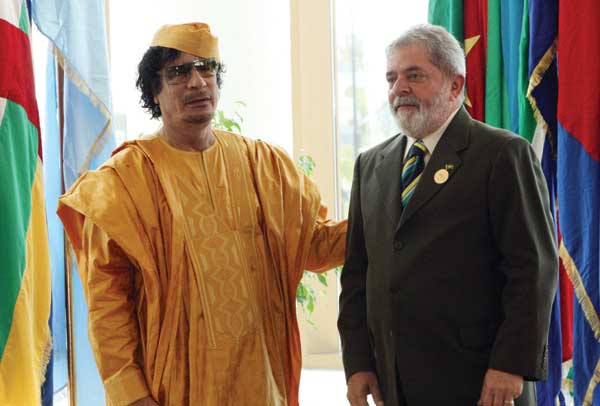
Libya's President Moammar Gadhafi welcomes Brazilian President Luiz Inacio Lula Da Silva to Libya
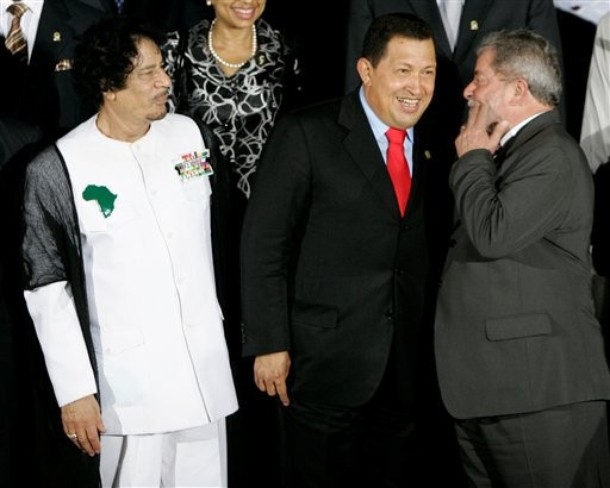
Brazil's President Luiz Inacio Lula Da Silva, right, speaks to Venezuela's President Hugo Chavez, center,
as Libya's President Moammar Gadhafi looks at them, in Venezuela, September 26, 2009
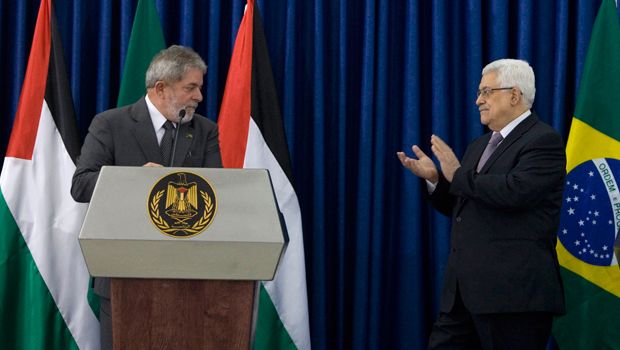
Mahmoud Abbas welcomes Brazilian President Luiz Inacio Lula da Silva to Ramallah on March 17, 2010
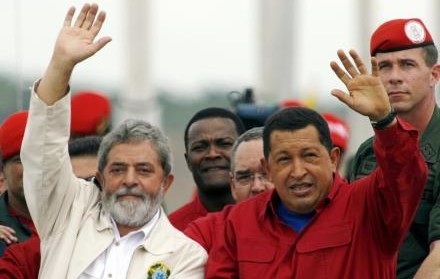
Brazilian President Luiz Inacio Lula da Silva welcomes Venezuelan President Hugo Chavez to Brazil
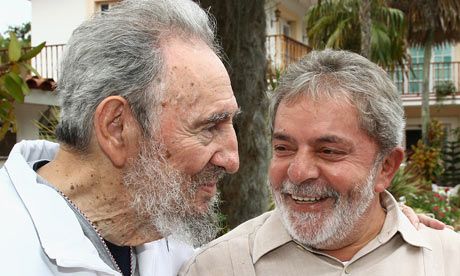
The Brazilian president, Luiz Inacio Lula da Silva with
Cuban leader Fidel Castro in Havana, Cuba, on February 25, 2010
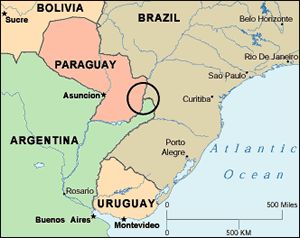
NTI Research:
Islamist Terrorist Threat in the Tri-Border Region
The tri-border region, formed by the cities of Puerto Igauzu, Argentina, Foz do Iguazu Brazil,
and Ciudad del Este, Paraguay, has a reputation for lawlessness and an historical presence of terrorist
elements. For decades the region has been home to various smugglers, terrorists, drug traffickers,
arms dealers, and organized crime figures from Russia, Japan, China, and Nigeria, among other countries.
Terrorists from the Middle East have also been found in the area, particularly from Lebanon and Syria.
A former FBI director described the area as a "free zone for significant criminal activity,
including people who are organized to commit acts of terrorism."
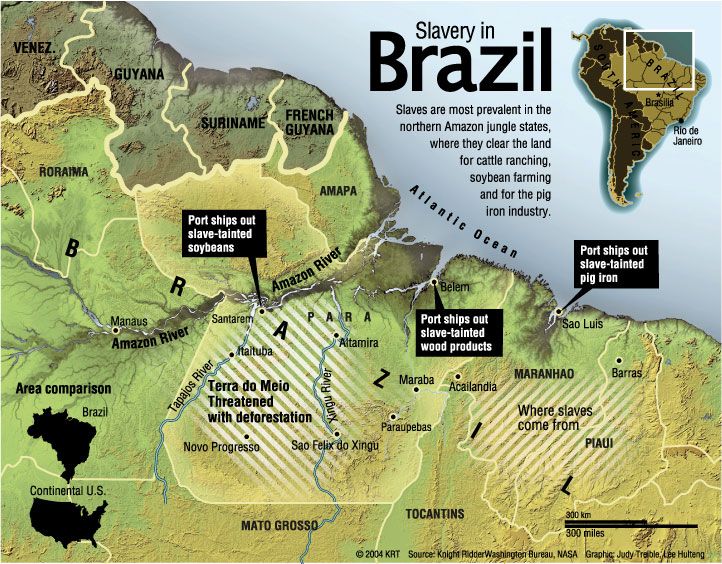
Guardian News:
Brazilian taskforce frees more than 4,500 slaves after record number of raids on remote farms
Acording to Brazil's National Commission for the Eradication of Slave Labour:
"It is a very sad situation that leaves you feeling impotent. The federal government has acted
but having slave labour in a country where the wealth is so evident is a very painful contradiction"
"Like any major crime in any country, you don't get away with slavery without the collusion of politicians"

War Crimes Blog:
Today in History: The Carandiru Prison Massacre
On Oct. 2, 1992, riot police from the Brazilian police force forcibly put down a
riot in the Carandiru Detention Center, killing 111 in Brazil's worst prison massacre.
Col. Ubiratan Guimaraes of the Sao Paulo Police, who was in charge of the raid, was tried and
convicted for murder of 102 of the inmates. His defense team argued that he was only following
orders during the riot. This same defense was declared illegitimate almost 50 years earlier
during the Nuremberg Trials examining the atrocities committed by Nazi Germany.
Videos From Brazil
Police vs police in Brazil
White Power no Brasil - Jornal da Noite
Mae e acusada de ter torturado filhos
PCC na Tv Globo
Organized crime in Sao Paulo, Brazil
Drug addicts a challenge for Sao Paulo
Sao Paulo under attack
Organized crime in Sao Paulo, Brazil
Brazil - Police Corruption
Rio Scare: Vehicles torched, gunshots on streets, 21 dead in Brazil
Brazilian police clash with gangs in Rio
Armed Gunmen Take 35 Hotel Hostages in Rio de Janeiro, Brazil
Brazilian children doing drugs in Sao Paulo
Brasil: Gangs shoot down police chopper
Brazil - Rio de Janeiro, War Against Drug Trafficking
Please help us pray for the safety and good health of these children !!!
Please help us save these young innocent and beautiful children !!!
Please help us bring these children back home !!!
Please email us at help@hatufim.org if you have any helpful information.
Thank you !!!
Hatufim.org is constantly being updated with new information and developments.
For additional pictures & info please click the links below:
| Yehezkel Hanan | Israel Haim | Yoshua Itai | Love |
| Divorce | GET | UCCJEA | Orders | Laws | Torah |
| Smadar Hameiry | Trauma | Abusive | Crazy |
| Psychological | Partners | Brazil | Disclaimer |
| Lawyer | Excuse | School | Justice | Cult |
| Hague | UNCRC | Stats | Video |
| FBI 1 | FBI 2 | FBI 3 | NCMEC |
| Help Smadar Hameiry return to Israel |
| Summary | Documentary |
Ignorance is Our Worst Enemy...
until the abducted children are returned to Israel...
As soon as the children are returned to Israel, this website will be deleted...
